- Home
- Tahereh Mafi
This Woven Kingdom Page 3
This Woven Kingdom Read online
Page 3
Alizeh breathed deep, pulling the cold air into her lungs. She hated the cold, but the chill was bracing, at least, and the perpetual discomfort kept her awake better than any cup of tea had done. Alizeh had slept maybe two hours the night prior, but she could not allow herself to dwell on the deficit. She was expected to start work for Mrs. Amina in precisely one hour, which meant she’d have to accomplish a great deal in the next sixty minutes.
Even so, she hesitated.
The knife at her throat had discomposed her. It was not the aggression she found unnerving—in her time on the streets she’d dispatched far worse than a hungry boy wielding a knife—it was the timing. She’d not forgotten the events of last night, the devil’s voice, the young man’s face.
She’d not forgotten; she’d simply set it aside. Worrying was its own occupation—for Alizeh, a third occupation. It was a job that required of her the free time she seldom possessed, so she often shelved her distress, leaving it to collect dust until she found a moment to spare.
Still, Alizeh was no fool.
Iblees had been haunting her all her life, had driven her near to madness with his indecipherable riddles. She’d never been able to fathom his abiding interest in her, for though she knew the frost in her veins made her unusual even among her own people, it seemed an insufficient reason to recommend the girl for all this torture. Alizeh hated how her life had been plaited with the whispers of such a beast.
The devil was universally reviled by Jinn and Clay, but it had taken humans millennia to discern this truth: that Jinn hated the devil perhaps more than anyone else. Iblees was responsible, after all, for the downfall of their civilization, for the lightless, unforgiving existence to which Alizeh’s ancestors had long been sentenced. Jinn suffered dearly as a result of Iblees’s actions—his arrogance—at the hands of humans who for thousands of years considered it their divine duty to expunge the earth of such beings, beings seen only as descendants of the devil.
The stain of this hatred was not so easily lifted.
One certainty, at least, had been proven to Alizeh over and over: the devil’s presence in her life was an omen, a portending of imminent misery. She’d heard his voice before every death, every sorrow, before every inflamed joint upon which her rheumatic life turned. Only when she was feeling particularly soft of heart did she acknowledge a nagging suspicion: that the devil’s missives were in fact a perverse sort of kindness, as if he thought he might blunt an inevitable pain with a warning.
Instead, the dread often made it worse.
Alizeh spent her days wondering what torture might befall her, what agony lay in wait. There was no telling how long it—
Her hand froze, forgot itself; her bloody handkerchief fluttered to the ground, unnoticed. Alizeh’s heart suddenly pounded with the force of hooves, beating against her chest. She could scarcely draw breath. That face, that inhuman face. Here, he was here—
He was already watching her.
She noticed his cloak at almost the same time she noticed his face. The superfine black wool was heavy, exquisitely crafted; she recognized its subtle grandeur even from here, even in this moment. It was without question the work of Madame Nezrin, the master seamstress of the empire’s most eminent atelier; Alizeh would recognize the woman’s work anywhere. In point of fact, Alizeh would recognize the work of most any atelier in the empire, which meant she often needed only a single look at a stranger to know how many people might pretend to mourn them at a funeral.
This man, she decided, would be mourned by a great many sycophants, his pockets deeper, no doubt, than Dariush himself. The stranger was tall, forbidding. He’d drawn the hood over his head, casting most of his face in shadow, but he was far from the anonymous creature he hoped to be. In the wind, Alizeh glimpsed the lining of his cloak: the purest ink silk, aged in wine, cured with frost. Years, it took, to create such a textile. Thousands of hours of labor. The young man likely had no idea what he wore, just as he seemed to have no idea that she could tell, even from here, that the clasp at his throat was pure gold, that the cost of his simple, unadorned boots would feed hundreds of families in the city. He was a fool to think he might disappear here, that he might have the advantage of her, that he might—
Alizeh went deathly still.
Understanding awoke slowly in her mind, and with it a thick, disorienting unease.
How long had he been standing there?
There once was a man
who bore a snake on each shoulder
In truth, Alizeh might not have noticed him at all were he not looking directly at her, pinning her in the air with his eyes. It hit her then—she gasped—hit her with the force of a thunderclap: she saw him now only because he allowed it.
Who was the fool, then?
She.
Panic set fire to her chest. Alizeh tore herself from the ground and fairly disappeared, tearing off through the streets with the preternatural swiftness she usually saved for her worst altercations.
Alizeh did not know what darkness this strange, Clay face would bring. She only knew she’d never be able to outrun it.
Still, she had to try.
Four
THE MOON SAT SO LARGE in the sky Kamran thought he might lift a finger to its skin, draw circles around its wounds. He stared at its veins and starbursts, white pockmarks like spider sacs. He studied it all as his mind worked, his eyes narrowing in the aftermath of an impossible illusion.
She’d fairly disappeared.
He’d not meant to stare, but how, also, was he meant to look away? He’d seen danger in the assailant’s movements even before the man drew his knife; worse, no one paid the altercation any attention. The girl could’ve been maimed or abducted or murdered in the worst ways—and even though Kamran had been sworn to anonymity in daylight, his every instinct compelled him to issue a warning, to step in before it was too late—
He needn’t have worried.
Still, there was much that troubled him, not the least of which was that there’d seemed something amiss about the girl. She’d worn a snoda—a sheath of semi-transparent silk—around her eyes and nose, which did not obscure, exactly, but blur her features. The snoda itself was innocuous enough; it was required of all who worked in service. She was ostensibly a maid.
But servants were not required to wear the snoda outside of work, and it was unusual that the girl had worn hers at this early hour, when the royals were still abed.
It seemed far more likely that she was not a maid at all.
Spies had been infiltrating the empire of Ardunia for years, but these numbers had been bloating dangerously in more recent months, feeding an unnerving concern that lately crowned Kamran’s thoughts, and which he could not now shake.
He exhaled his frustration, shaping a cloud in the cold.
More in every moment, Kamran grew convinced the girl had stolen the servants’ uniform, for her covert attempt had not only been poorly executed, but easily betrayed by an ignorance of the many rules and mannerisms that defined the lives of the lower classes. Her gait alone would’ve been warning enough; she’d walked too well for a servant, carrying herself with a kind of regal bearing established only in infancy.
No, Kamran felt certain now that the girl had been hiding something. It would not be the first time someone had used the snoda to mask themselves in public.
Kamran glanced at the clock in the square; he’d come into town this morning to speak with the Diviners, who’d sent a mysterious note requesting an audience with the young man despite his never having announced his return home. Today’s meeting, it seemed, would have to wait; for much to his dismay, Kamran’s always-reliable instincts would not quiet.
How, with only one free hand, had a maid so coolly disarmed a man holding a knife to her throat? When would a maid have had the time or coin to spare learning self-defense? And what on earth had she said to the man to leave him weeping in the snow?
The suspect in question was only now stumbling to his feet. His
shock of red curls screamed he was from Fesht, a region at least one month south of Setar, the capital city; not only was the assailant far from home, but he appeared to be in severe pain, one arm hanging lower than the other. Kamran watched as the redhead held his bad limb—dislocated, it seemed—with the good, carefully steadying himself. Tears had tracked clean paths down his otherwise dirty cheeks, and for the first time, Kamran got a good look at the criminal. Had he more practice with outward displays of emotion, Kamran’s features might’ve registered surprise.
The assailant was quite young.
Kamran moved swiftly toward him, sliding a mask of intricate chain mail over his face as he went. He walked into the wind, his cloak snapping against his boots, and only when he’d all but collided with the child did he stop. It was enough that the Fesht boy jumped back at his approach, wincing as the movement jostled his injury. The boy cradled his wounded arm and curled inward, head to his chest like a humbled millipede, and with an unintelligible murmur, tried to pass.
“Lotfi, hejj, bekhshti—” Please, sir, excuse me—
The gall of this child, Kamran could scarce believe it. Still, it was a comfort to know that he’d been correct: the boy spoke Feshtoon and was far from home.
Kamran had every intention of handing the child over to the magistrates; it had been his sole purpose in seeking out the boy. But now, unable to pry loose his suspicions, he found himself hesitating.
Again, the child tried to pass, and again, Kamran blocked his path. “Kya tan goft et cheknez?” What did the young woman say to you?
The boy startled. Stepped back. His skin was a shade or two lighter than his brown eyes, with a smattering of darker freckles across his nose. Heat blossomed across his face in unflattering splotches. “Bekhshti, hejj, nek mefem—” I’m sorry, sir, I don’t understand—
Kamran stepped closer; the boy nearly whimpered.
“Jev man,” he said. “Pres.” Answer me. Now.
The boy’s tongue came loose then, almost too quickly to be comprehensible. Kamran translated in his head as the child spoke:
“Nothing, sir—please, sir, I didn’t hurt her, it was only a misunderstanding—”
Kamran clamped a gloved hand around the boy’s dislocated shoulder and the Fesht boy cried out, gasping as his knees buckled.
“You dare lie to my face—”
“Sir—please—” The child was crying now. “She only gave me back my knife, sir, I swear it, and—and then she offered me bread, she said—”
Kamran rocked backward, dropping his hand. “You continue to lie.”
“On m-my mother’s grave, I swear. On all that is holy—”
“She returned your weapon and offered to feed you,” Kamran said sharply, “after you nearly killed her. After you tried to steal from her.”
The boy shook his head, tears welling again in his eyes. “She showed me mercy, sir— Please—”
“Enough.”
The boy’s mouth snapped shut. Kamran’s frustration was mounting; he wanted desperately to throttle someone. He searched the square once more, as if the girl might appear as easily as she’d evaporated. His gaze landed again on the boy.
It was like thunder, his voice.
“You pressed a blade to a woman’s throat like the worst coward, the most detestable of men. That young woman might’ve shown you mercy but I see no reason to do the same. You expect to walk away from this without judgment? Without justice?”
The boy panicked. “Please, sir—I will go and die, sir—I will slit my own throat if you ask me to, only don’t hand me over to the magistrates, I beg you.”
Kamran blinked. The situation grew more complicated by the second. “Why do you say such a thing?”
The boy shook his head then, growing only more hysterical. His eyes were wild, his fear too palpable for theater. Soon he began to wail, the sound ringing through the streets.
Kamran did not know how to calm the urchin; his own dying soldiers had never allowed themselves such weakness in his presence. Too late, Kamran considered letting the boy go, but he’d hardly begun to formulate the thought when, without warning, the child drove the length of the crude blade into his own throat.
Kamran inhaled sharply.
The boy—whose name he did not know—choked on his own blood, on the knife still buried in his neck. Kamran caught him when he fell, could feel the outline of the boy’s ribs under his fingers. He was light as a bird, bones hollowed out, no doubt, by hunger.
Old impulses prevailed.
Kamran issued commands to passersby with the voice he used to lead a legion, and strangers appeared as if out of thin air, abandoning their own children to carry out his orders. His head was so dense with disbelief he hardly noticed when the boy was lifted from his arms and carried out of the square. The way he stared at the blood, the spotted snow, the red rivulets circling a manhole cover—it was as if Kamran had never seen death; hadn’t seen it a thousand times over. He had, he had, he thought he’d seen all manner of darkness. But Kamran had never before witnessed a child commit suicide.
It was then that he saw the handkerchief.
He’d watched the young woman press it to her throat, to the wound inflicted by a boy who was now presumably dead. He’d watched this strange girl manage her own near-death with the forbearance of a soldier, meting out justice with the compassion of a saint. He held no doubt now that she was indeed a spy, one in possession of an astuteness of mind that surprised him.
She’d known in but a moment how to handle the child, had she not? She’d done far better than he, had judged better; and now, as he processed her earlier escape, his fears only ratcheted higher. It was rare that Kamran experienced shame, but the sensation roared inside him now, refusing to be quieted. With a single finger, he lifted the embroidered square out of the snow. He’d expected the white textile to be stained with blood.
It was pristine.
Five
KAMRAN’S HEELS KNOCKED AGAINST THE marble floors with unusual force, the sounds echoing through the cavernous halls of his home. Upon his father’s death Kamran had discovered that he could be propelled through life by a single emotion; carefully cultivated, it grew hot and vital inside his chest, like an experimental organ.
Anger.
It kept him alive better than his heart ever had.
He felt anger always, but he felt it especially now, and Lord save the man who crossed him when he was at his worst.
After tucking the girl’s handkerchief into his breast pocket, he’d pivoted sharply, single-minded as he strode toward his horse, the animal patiently awaiting his return. Kamran liked horses. They did not ask questions before doing as they were told; at least not with their tongues. The jet stallion had not minded his master’s bloodied cloak nor his distracted temper.
Not the way Hazan did.
The minister trailed him now with impressive speed; his the second set of boots pounding the stone floors. Had they not grown up together, Kamran might’ve reacted to this insolence with an inelegant method of problem-solving: brute force. But then, it was his incapacity for awe that made Hazan perfect for his role as minister. Kamran could not countenance sycophants.
“You are worse than an idiot, did you know?” Hazan said with great serenity. “You should be nailed to the oldest Benzess tree. I should let the scarabs strip the flesh from your bones.”
Kamran said nothing.
“It could take weeks.” Hazan had caught up, and now he kept pace easily. “I would watch, happily, as they devoured your eyes.”
“Surely, you exaggerate.”
“I assure you, I do not.”
Without warning, Kamran stopped walking; Hazan, to his credit, did not falter. The two young men turned sharply to face each other. Hazan had once been the kind of boy whose knees resembled arthritic knuckles; as a child, he could hardly stand up straight to save his life. Kamran could not help but marvel at the difference in him now, at the boy who’d grown into the kind of man who felt co
mfortable threatening to murder the crown prince with a smile.
It was with a begrudging respect that Kamran met his minister’s eyes. They were nearly the same height, he and Hazan. Similar builds.
Wildly different features.
“No,” Kamran said, sounding tired even to himself. The sharp edge of his anger had begun to fade. “As to your enthusiasm for my brutal death, I have no doubt. I refer only to your assessment of the damage you claim I’ve done.”
Hazan’s hazel eyes flashed at that, the only outward sign of his frustration. Still, he spoke calmly when he said, “That there lingers any uncertainty in your mind that you’ve not committed a grievous error says only to me, sire, that you should have your neck checked by the palace butcher.”
Kamran almost smiled.
“You think this is funny?” Hazan took a measured step closer. “You’ve only alerted the kingdom to your presence, only shouted into a crowd every proof of your identity, only marked yourself as a target while entirely unguarded—”
Kamran unlatched the clasp at his throat, stretched his neck, let the cloak drop. The article was caught by unseen hands, a specter-like servant scraping in, then out of sight with the bloodied garment. In the fraction of a second he saw the blur of the servant’s snoda he was reminded, again, of the girl.
Kamran dragged a hand down his face, with grim results. He’d forgotten about the boy’s dried blood on his hands and hoped he might forget again. In the interim, he only half listened to the minister’s reprimands, with which he did not at all agree.
The prince neither saw his actions as foolish, nor did he think it beyond him to be interested in the affairs of the lower classes. Privately, Kamran might allow an argument defending the futility of such an interest—for he knew if he were to concern himself with every violent attack on the city streets he’d scarcely find time to breathe—but apart from the fact that an interest in the lives of the Ardunian people was entirely within the prince’s purview, the morning’s bloodletting had seemed to him more than a random act of violence. Indeed the more he’d studied the situation the more nefarious it had presented, its actors more complex than first appeared. It had seemed wise, at the time, to insert himself in the situation—

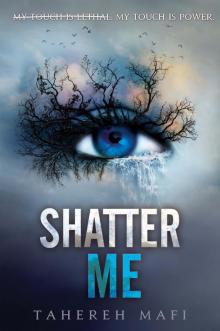 Shatter Me
Shatter Me Restore Me
Restore Me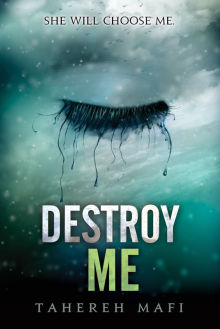 Destroy Me
Destroy Me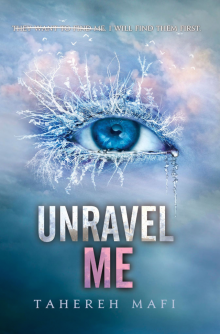 Unravel Me
Unravel Me Ignite Me
Ignite Me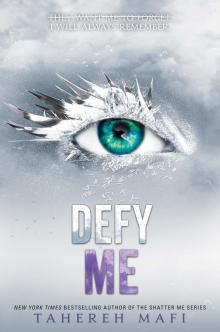 Defy Me
Defy Me Fracture Me
Fracture Me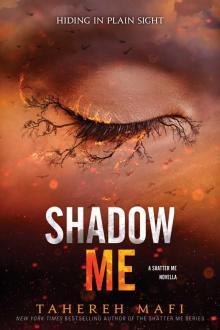 Shadow Me
Shadow Me Whichwood
Whichwood Reveal Me
Reveal Me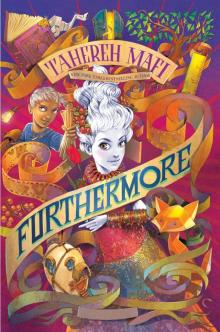 Furthermore
Furthermore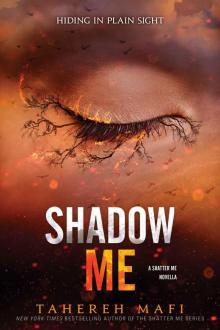 Shadow Me (Shatter Me Novella)
Shadow Me (Shatter Me Novella) Believe Me
Believe Me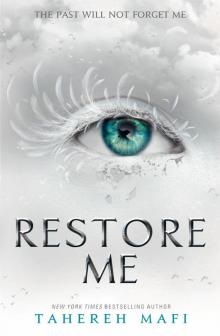 Restore Me (Shatter Me)
Restore Me (Shatter Me)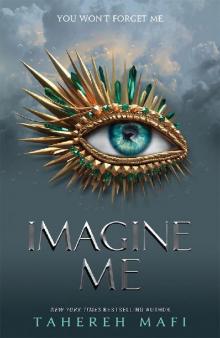 Imagine Me
Imagine Me An Emotion of Great Delight
An Emotion of Great Delight Find Me
Find Me A Very Large Expanse of Sea
A Very Large Expanse of Sea Unravel Me: The Juliette Chronicles Book 2
Unravel Me: The Juliette Chronicles Book 2